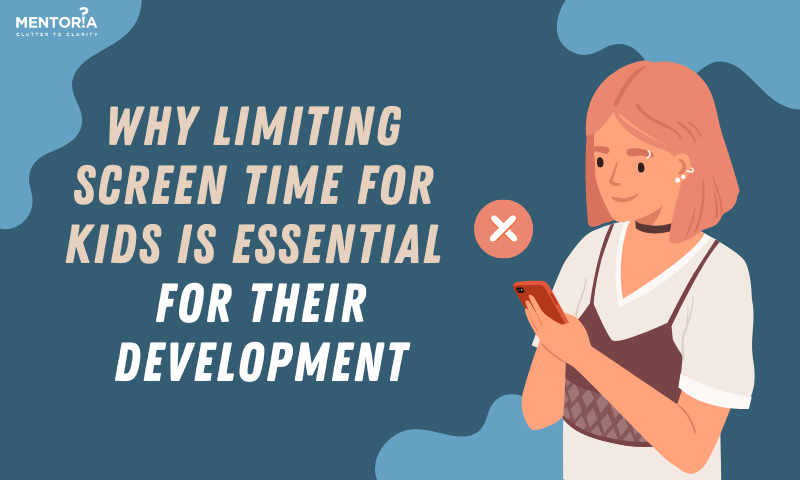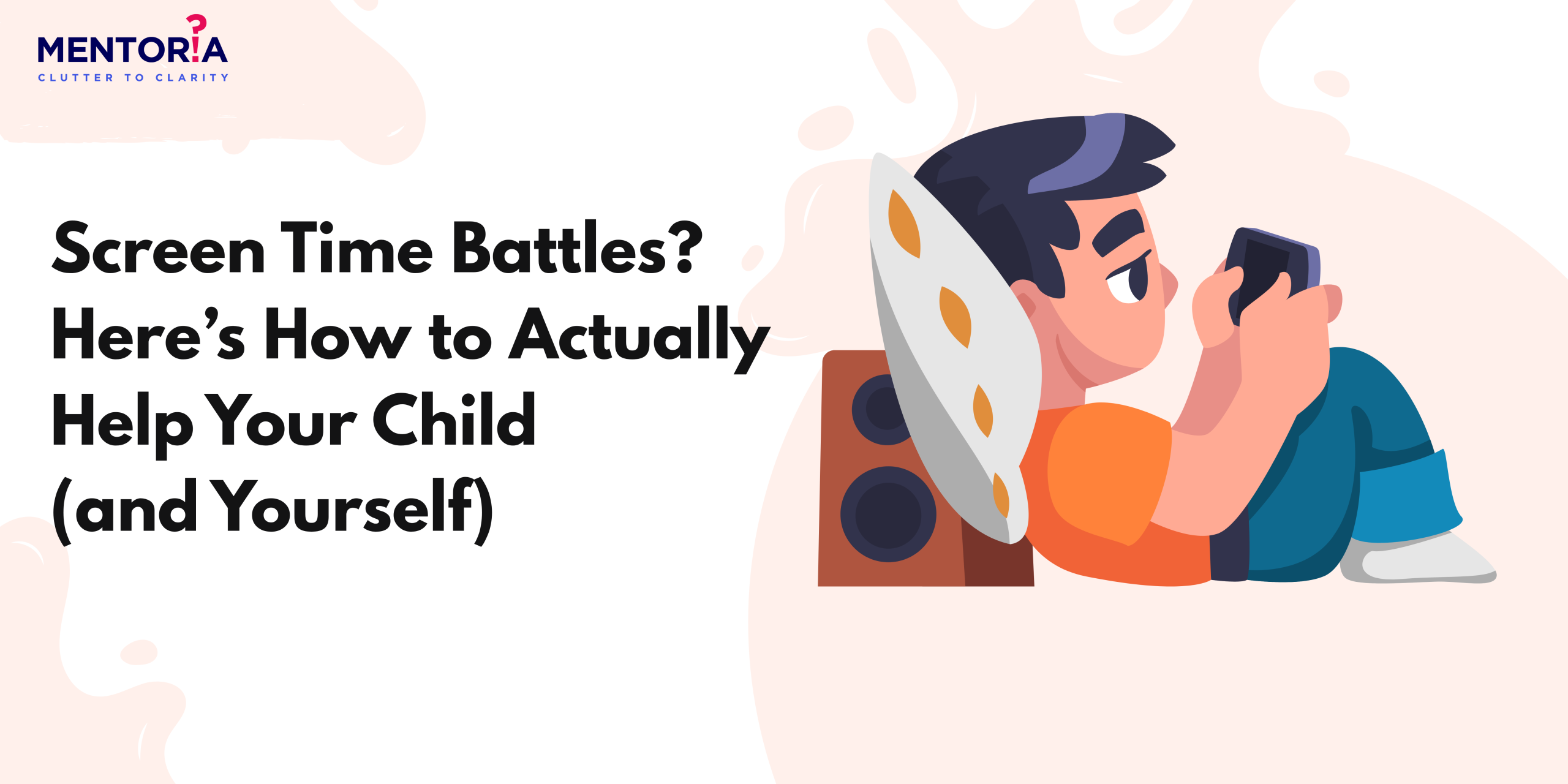Why Limiting Screen Time For Kids Is Essential For Their Development

Remember the feeling of absolute elation when you finally convinced your parents to buy you that fancy new Gameboy or the latest PlayStation? The feeling of holding that controller and being sucked into the digital world was truly magical, wasn’t it? But fast forward a few years, and we realise that too much of a good thing can have some serious consequences.
In this blog, we’re going to talk about the importance of limiting screen time for kids. As a generation, we are surrounded by technology, and while it certainly has its benefits, it’s important to acknowledge that excessive screen time can have detrimental effects on a child’s development. But don’t worry, we’re not here to ruin all the fun. We’ll be sharing some tips and tricks to help you balance screen time and still enjoy all the amazing things technology has to offer. So put down that phone, pause that game, and let’s dive in. Let’s unplug to play! So put down that phone, pause that game, and let’s dive in. Let’s unplug to play!
Screens: The Silent Villain In Disguise
Let’s face it – screens have become an integral part of our lives. From smartphones to laptops to tablets, we’re constantly surrounded by technology. But did you know that too much screen time can lead to a host of negative effects on children’s health and well-being?
For starters, excessive screen time has been linked to obesity. Children who spend more time on screens are less likely to engage in physical activities and are more likely to consume junk food while glued to their screens. And let’s be real, who hasn’t had the urge to snack while binge-watching their favourite show?
Moreover, screens have also been shown to disrupt sleep patterns, leading to a host of problems like difficulty falling asleep, staying asleep, and waking up in the morning. The blue light emitted by screens suppresses the release of melatonin, a hormone that regulates sleep-wake cycles.
And let’s not forget about the behavioural problems associated with too much screen time. Research has shown that children who spend more time on screens are more likely to experience attention issues, impulsivity, and difficulty with self-regulation.
So, the next time you’re tempted to hand your child a screen for a quick distraction, think twice. Screens may seem like a harmless tool, but they could be the silent villain in disguise, wreaking havoc on your child’s health and well-being.
The Perks Of Logging Off: Why Unplugging Is The New Cool
Are you tired of feeling drained and uncreative after spending hours on end scrolling through social media feeds? It’s time to unplug and embrace the many benefits of limiting your screen time. Here are just a few reasons why unplugging is the new cool:
1. Boost Your Mental Health: Constantly being plugged in can lead to anxiety, depression, and even addiction. Taking breaks from screens and technology can reduce your stress levels and improve your overall mental health.
2. Get Creative: When was the last time you picked up a paintbrush, wrote in a journal, or played an instrument? Limiting screen time can help you tap into your creativity and explore new hobbies and interests.
3. Build Better Relationships: Let’s be real, it’s hard to fully connect with someone when you’re constantly checking your phone. Unplugging can improve your social skills and help you build stronger relationships with the people around you.
4. Get Better Sleep: The blue light emitted from screens can disrupt your body’s natural sleep cycle, making it harder to fall asleep and stay asleep. By unplugging before bed, you can improve the quality of your sleep and wake up feeling refreshed.
So, next time your child reaches for their phone or tablet, encourage them to put it down and engage in some screen-free activities. You might be surprised at the positive impact it can have on their development and happiness.
Say Goodbye To Screens, Hello To Adventure: Practical Tips For Unplugging
Now that you know the benefits of limiting screen time, it’s time to learn some practical tips to help your kids unplug. Here are some fun and helpful tips:
1. Set Boundaries: It’s essential to set clear boundaries on screen time for your kids. One way to make screen time limits more effective is to involve your children in setting them. Have a family meeting to discuss how much time each family member can spend on screens daily, and then set rules together. This way, your children will be more likely to follow the rules since they were part of creating them. For example, you can set a rule that they can only use their devices for a certain amount of time each day or week.
2. Encourage Outdoor Play: Encourage your kids to spend more time outside, exploring nature, and being active. Not only is outdoor play good for physical health, but it’s also great for mental health. Spending time in nature has been shown to reduce stress and increase happiness. To make outdoor time more fun, consider playing games like tag, hide-and-seek, or capture the flag. You can also plan outdoor scavenger hunts or nature walks to explore your local park or hiking trail. This can be as simple as going for a family hike, playing catch in the park, or taking a bike ride together.
3. Find Alternative Activities: Help your kids find alternative activities to do instead of using screens. To make alternative activities more appealing to your children, get creative! You can make a game out of reading by setting up a reading challenge with rewards or by reading together as a family. For puzzles, try creating a puzzle challenge and time how long it takes each family member to complete it. For hobbies, you can search online for tutorials or join a local group to learn and practise new skills together. This can include reading books, doing puzzles, playing board games, or trying a new hobby like painting or dancing.
4. Lead by Example: Kids are more likely to follow your lead, so make sure you’re also limiting your own screen time. Children learn by example, so it’s important to model good behaviour when it comes to screen time. Try to limit your own screen time and instead, engage in activities that involve your children. Encourage family activities that don’t involve screens, such as family game night or cooking together.
5. Reward Unplugging: Create a reward system for when your kids unplug. For example, you can reward them with extra time to play outside or a special activity they’ve been wanting to do. Rewards can be a great motivator for children, but they don’t have to be expensive or elaborate. Consider creating a “rewards jar” where your children can earn a small treat, like a piece of candy or a sticker, each time they unplug for a certain amount of time. You can also reward your children with extra screen-free activities, like a trip to the park or a family outing.
Remember, it’s all about finding a balance that works for your family. By implementing these practical tips, you can help your kids develop healthy habits around screen time.
Ready To Cap Your Child’s Screen Time?
By limiting children’s exposure to screens and encouraging alternative activities, parents can help their kids reap the benefits of unplugging, such as better mental health, creativity, and social skills- and now that you know it, time to take a step in that direction! If you need help with creating the right parenting style suitable to your needs or helping your child pick a career, we are here for you. Mentoria offers everything from parental to career guidance.










